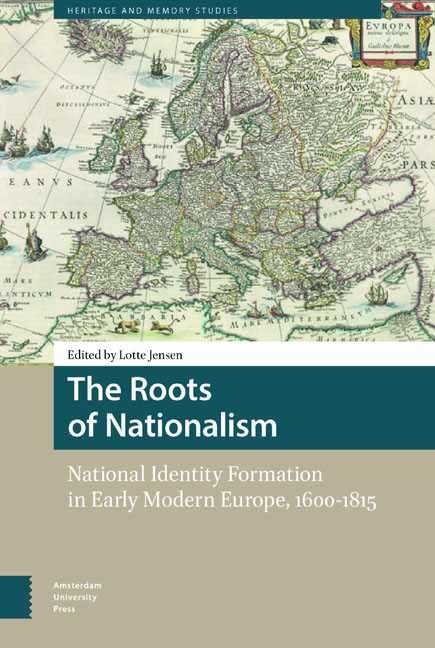Book contents
- Frontmatter
- Contents
- The Roots of Nationalism: Introduction
- Part One The Modernist Paradigm Contested
- Part Two The Genealogy of National Identity
- Part Three Negative Mirror Imaging
- Part Four Maps, Language and Canonisation
- Part Five Nation in the Age of Revolution
- List of Illustrations
- List of Contributors
- Index
12 - The Roots of Modern Hungarian Nationalism: A Case Study and a Research Agenda
Published online by Cambridge University Press: 03 February 2021
- Frontmatter
- Contents
- The Roots of Nationalism: Introduction
- Part One The Modernist Paradigm Contested
- Part Two The Genealogy of National Identity
- Part Three Negative Mirror Imaging
- Part Four Maps, Language and Canonisation
- Part Five Nation in the Age of Revolution
- List of Illustrations
- List of Contributors
- Index
Summary
The Hungarian proverb ‘A nyelvében él a nemzet’ (‘The nation lives in its language’) expresses the fact that the Hungarian language is the most prominent feature of modern Hungarian nationalism. Although this proverb has been documented only from the mid-nineteenth century, I will attempt to demonstrate in this chapter that the Hungarian language is one of the core features of early modern Hungarian nationhood as well. Native knowledge of the Hungarian language is a prerequisite for claiming Hungarian national and cultural identity. As a consequence, only native speakers of Hungarian are considered to be members of the Hungarian nation. Note that this presupposes an ethnie, an ethno-linguistic community in the sense of Anthony Smith. This also implies that the ethno-linguistic community is an antecedent to the development of the modern Hungarian nation. Hence, language is one of the most important roots of modern Hungarian nationalism. If this implication is correct, the question arises regarding how Hungarian nationalism should be analysed within the different theoretical paradigms available in the scholarly literature.
The scholarly literature on the origins of nationalism has been dominated by the modernist account elaborated in the work of Hobsbawm and Gellner. The central thesis of the modernist account, contrary to the traditionalist one, is that modern nationhood is an artificial by-product of the ‘Great Transformation’ produced by the French and the Industrial Revolutions. From this thesis the claim follows that modern nationhood has no premodern, historical antecedents whatsoever. To put it differently, the modernist school claims that there is a radical disjuncture between premodern, existing ethnicities and nation-state formation. However, the work of scholars like Anderson, Holton, May and Smith leaves open the possibility of a ‘third’ position that postulates a connection between modern nationhood and premodern ethnicity. Although Anderson's position on nation formation falls into the modernist school, there is a contradiction in his work. His notion of ‘print capitalism’ explains the spread of languages that is central to the forming of homogeneous speech communities and ‘imagined communities’ of the nations. This type of nation formation appears as early as the sixteenth century, as I will demonstrate below. The modernist paradigm hypothesises, however, that there is no connection between early forms of nationalism and the modern industrial states.
- Type
- Chapter
- Information
- The Roots of NationalismNational Identity Formation in Early Modern Europe, 1600–1815, pp. 235 - 250Publisher: Amsterdam University PressPrint publication year: 2016



